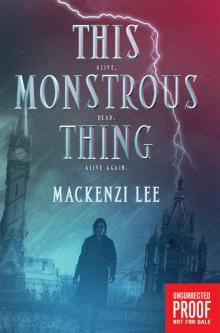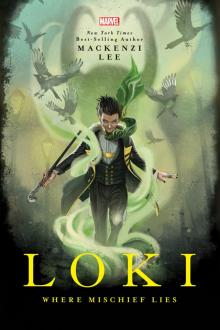- Home
- Mackenzi Lee
The Lady's Guide to Petticoats and Piracy Page 14
The Lady's Guide to Petticoats and Piracy Read online
Page 14
I need to warn her. I was a fool to bring Sim here. A fool to think she’d hold up her end of a hollow promise. But ambition can infect your sensibilities and poison them like a well. There’s a reason most geniuses have failed marriages and no friends.
I leave Max in the room and dash down the stairs. The Polterabend is spilling outside from the grand parlor in the back of the house. There are tables stacked with china to be ceremonially smashed, guests retrieving their dishes to be broken upon the stones outside. There is an excess of lamps to illuminate the cards and dice being played around the room, though hands are starting to be dropped and parties shuffled outside toward the traditional smashing, now that the bride has arrived. There’s a quartet playing in one corner. The violinist has legs too long for the small stool he’s been confined to, and they’re folded under him at an awkward crimp, one foot twisted almost impossibly around for balance, like an unstrung marionette that has landed in a tangle. I think of Percy and suddenly want to be home so much it hurts. Or not home so much as . . . I don’t know what I’m missing. It’s a queer thing, to have a vacant space inside you and not know what it is that carved out the absence.
There’s the crash of a dish prematurely broken out on the veranda, and a few people begin to howl with laughter. I follow the sound into the night, feeling so hot a cloak would have been redundant until the winter air gets its teeth in me and I shiver. Above me, the sky is murky with clouds, stars scattered between them like seashells on a beach.
On the veranda, everyone is wrapped in furs and velvet, some of them masked with feathers and scales painted or pasted over the frame. Others have the same feathers and scales pressed straight onto their faces like pox patches. Women have whole birds in their hair, wings attached to the sleeves of their dresses or the hems of their cloaks. The servants carrying lanterns are dressed in black feathers so that the lights look like they’re floating. The light flashes off the pottery everyone is holding, glazed and shimmering like cupped fireflies between their hands. Everything feels overwrought and overdrawn, too bright and too loud and too disorienting. No one looks like themselves, or even truly human.
I should be looking for Platt. He asked me to be here, told me he wanted to talk about my work and study. I should be thinking of myself and my future and my career.
But all I want to do is find Johanna.
I spot her talking to a man with octopus tentacles woven into his wig and a wineglass in each hand. In the silvery light of the lamps on the snow, she looks like a mermaid, or the figurehead of a ship, the sort of plump, heavenly siren that would have sailors throwing themselves into the sea at just a crook of her finger. The feathers sewn onto her dress move slowly in the breeze, like kelp underwater, and when she turns toward the faint light spilling from the house and tussling with the stars, the powder on her skin makes her cheeks sparkle.
She shrieks with delight when she sees me coming, like this is the first time we’ve seen each other all night—or perhaps simply as an excuse to abandon the man trying to force one of the glasses upon her—and holds out a hand for me to take. “Felicity! I’ve been looking for you! I’m sorry I left you with the dog; he didn’t give you any trouble, did he? Oh no, what happened to your dress?”
I pull the wilted sleeve up over my shoulder. It slips down again at once. “I need to talk to you,” I say. “Alone.”
“All right. I’ll be back, my Lord; don’t make a move until I return.” She taps the geriatric kraken’s nose with her fan, then lets me drag her away, up onto the porch and out of the circle of lantern light. “Do you think it looks all right?” she says as we go, trying to turn to get a look at the back of her dress. “I don’t think anyone can tell, but I can’t stop worrying about it.” I halt so abruptly she steps on the heel of my shoe and I almost stumble out of it. “What is it? What’s wrong?”
If I tell her, there will likely be no chance of working with Platt. What respectable physician would hire an outsider who had used devious means to gain access to him, lied her way into his home, and left his fiancé vulnerable to robbery?
But it’s Johanna beaming down at me, and all I say is “I’m sorry.” My voice comes out as thin as smoke.
A small crease appears between her eyebrows, the only blemish upon her face. “What are you sorry for? You did such a good thing for me earlier—”
“No, I have to tell you something.”
“Can it wait? I have to—”
“No, stop. Just stop talking, please, and listen to me.” I take her hands and she stills, her mouth pulling down into a frown. “The girl with me—Sim—she’s not my maid. She’s . . . I don’t know. A sailor. Maybe associated with bad people. She was looking at a book in your library, and your uncle caught her in his study, and I found her just now in your apartments robbing you, and she tried to make off with this.” I press the letter into her palms.
Johanna stares at me, then down at the letter. Her thumb traces the outline of the wax seal. “You’re a thief?”
“No, my maid is. She’s not my maid, she paid my way here in exchange for getting her into your house. I only came because I wanted to talk to Dr. Platt about a job. I’m not going to school. I’m not in touch with my family. I’ve been in Edinburgh for a year trying to get a medical education and no one will have me and if I don’t find work soon, I don’t know what I’ll do. I thought Dr. Platt could help me.”
“You lied to me.”
“Yes. Yes, I did.” I’m absolutely clutching at her hands, like that will keep her from leaving me without atonement. The scrap of the stolen letter crumples between us. “But I’m telling you now.”
“You think that matters?” she says, her already trilling voice rising to a whistle tone. “You’re telling me after I’ve been robbed. After you let this person into my home. After you let her into my rooms.”
“She told me she wasn’t here to steal anything.”
“And you believed her?” she demands. “Better question, why did you ally yourself with someone who had to make a clarifying point that she was not a thief? What did you think she was doing here? What did you think she wanted with me?”
I can’t even look at her. I comb back through my interactions with Sim, every moment from that first time we sat down in the pub, and I know Johanna’s right. I assumed the best, even while I told myself I was being suspicious and careful enough, because more than Johanna’s safety, more than any real concern for what Sim was doing, I was thinking of myself. “I had to talk to Dr. Platt,” I tell her. “You don’t understand what it’s like to be so stuck you’ll do anything to get out.”
She pulls in her lips. Bites her cheeks. Squeezes my hand. “Don’t I?”
It’s that moment that Dr. Platt himself, as though summoned, appears at her side, one hand fastening around her elbow. “Johanna. Where have you been? Your uncle is looking for you.” He spots me attached to her wrists and smiles. “Miss Montague, good evening. I was beginning to think you’d forgotten me.” His smile flips as he stares at my shoulder, and I realize one of my sleeves has puddled in the crook of my elbow. “Is your dress torn, or is that the fashion these days?”
I look between Johanna and Platt, mute. I think for certain she’ll tell him about what I’ve done, out me as the ambitious monster that I am. But instead, she presses the scrap of the letter back into my hand and folds my fingers over it before turning to Dr. Platt. “I’m ready if you and Uncle are,” she says, and suddenly she’s herself again, an actress composing herself before she steps on stage and becomes someone else.
“Let’s get on with it, then. May I?” he asks, and I realize I’m still holding Johanna’s hands. Or perhaps Johanna is holding mine. When she lets go, she leaves behind small half-moons on my knuckles from where her fingernails bit, and that damp, withered scrap of paper, the waxy seal starting to go soft from so much handling.
Anger rises in me as I watch them walk away, blotting out the guilt and panic like sand over ink. I’m not sure if she do
esn’t believe me or simply doesn’t want to believe me, and why didn’t she tell Platt or show him whatever correspondence was snatched or at least tell someone so that everyone in the house is ready to tackle Sim if they see her.
I watch Johanna and Platt descend the stairs, meeting her uncle halfway. He hands them each a plate, then raises his hand to the courtyard and calls for silence. The musicians break off. The crowd hushes.
Hoffman looks to Platt, who clears his throat and steps forward, letting Johanna’s arm fall from his. “We’re so happy,” he says, though his voice sounds flat and rehearsed, “you are all here to celebrate with us. I’m very lucky to have formed a partnership with the Hoffmans.” He nods to the uncle, then seems to remember this is actually meant to be about Johanna and adds, “And lucky as well to have found a woman who will tolerate a mad doctor for a husband.” There are a few laughs. I swear Johanna looks back at where I’m standing. And she looks like she wants to run. “If you’ll please join me . . .” Platt looks to Johanna’s uncle, who has a fixed smile while his face goes slowly red. What was likely supposed to be a grand speech from the groom was a mere two lines, but Platt raises his plate in the air, then reaches behind him and grabs Johanna’s hand, pulling her to his side. “Scherben bringen Glück!”
Johanna raises her plate, and the guests raise theirs, and they fling them to the ground, where they burst, shards streaking through the air like comets as they catch the lantern light. The air turns dusty with china plaster, a thin haze hovering over the evening and turning the barrels of light foggy with motes. There are screams of delight and laughter, and music begins to play as dishes are thrown, toppled, flung, and stepped upon.
Every one of them smashed.
10
Johanna disappears almost as soon as the china is broken, and I don’t dare approach Dr. Platt. If she told him about Sim—and who could blame her, to assure there was no chance of me entering their lives after I had gone on and on about how I had put her in danger just to meet Platt?—any hope I had of working with him or any connections he might have provided will be snuffed. He may be a rebel in the operating room, but I imagine offering his new bride up to a robber will put a permanent tarnish on a relationship.
I return to my room to find Sim’s knapsack gone. Which is part relief, part dread, because with her goes my way back to England. I wrangle myself out of my dress—more rip myself out, for it’s already beyond saving—and change into the weathered tartan skirt and bodice I arrived in. There is no point staying for the wedding now. Johanna will want nothing to do with me. She’ll likely turn Platt against me. I’m not certain how I’ll travel back to England—perhaps on credit, then show up on Callum’s doorstep and accept his proposal so long as he takes on the massive debt I have mustered in returning to him. Perhaps I’ll go back to London and try again. Perhaps I should take up factory work and hope that someone’s foot gets sucked into a machine occasionally and I have the chance to practice what I’ve spent so much time studying. Perhaps I should go back to my parents, tail tucked, and give it all up.
But it feels like living without a heart. Until now, I was chasing something, no matter how far in the distance it was. But now my only choice is going back, and going back means resigning myself to a life without work. Without study or purpose. And what kind of life is that?
Perhaps, like walking with a lamp in the dark, I must move forward before I am able to see the next bend in the road, but for now, I pack my things, then sit on the bed and wait for the sun to pearl along the horizon, feeling trapped within a shrinking box in an indifferent universe.
The first noise I hear does not come from the house raising its head in preparation for a wedding, but rather from the grounds outside. Someone is whistling, then a child’s voice cries in German, “Come on, doggie! Run!”
I stand and cross to the window. The sky is peach colored outside my window, the pine trees dark blades in silhouette against it. On the lawn, blanketed in snow still studded with flecks of broken china, a tiny girl with shocking blond hair and enormous ears is running circles around Max, who seems to have deflated, so flat is he lying on the ground. I wonder suddenly if it’s my fault he got out—perhaps I didn’t shut Johanna’s door properly last night and poor Max has been loping around the grounds in the dark.
I let myself out of my room, then dart down the stairs in my slippers and out onto the veranda, stopping upon the last step so I don’t wet my toes. “Max!” I call, and his head shoots up, spraying snow off his ears.
The girl stops running and stares at me, then throws her hands at the beastie as though in presentation. “I’ve brought the dog,” she says in German. “Money, please.”
“Did he get out?” I ask, making a tentative crossing of the snowy lawn toward her. My slippers, made for ladylike treads across carpet, are soaked by the time I reach her, but there is no chance the dog will be moved by this girl as delicate as a snowflake.
The girl puts her hand atop Max’s enormous head, giving him a two-fingered stroke between the eyes. “No, the lady at the carriage stop in Stuttgart gave me a kreuzer and said if I brought the dog back to the pink house, someone would give me another. But he looked so sad I thought he might want to play.”
I’m not sure how this small creature got Max anywhere, particularly when she hooks a hand around his bow and tries to pull him over to me. She seems to be throwing her whole weight into the act, and he barely budges. Stuttgart is at least two miles of playing carrot and stick with this creature away.
I suddenly realize I have entirely missed the key word of her statement. “Sorry, what lady?”
“The lady from the pink house in the country. They wouldn’t let her bring the dog on the diligence so she said you’d give me a kreuzer—”
“I don’t have a coin for you,” I interrupt. “You can go ask around the service door if you want your payment.”
As the girl prances off through the yard, I bend down and stroke Max on the head. “What were you doing in Stuttgart? You should be upstairs with Johanna getting dressed up for the big day.” He snort-whines, expelling a puff of frozen slobber from his jowls, and nudges his face into my skirt. His black lips pool against my knee. “Come on, let’s go find her.” I drag him up by the loose skin around his neck—I swear I lose sight of my hand in all the fur and folds—and pull him back into the house, then up the stairs toward Johanna’s room. He’s a reluctant companion, whining and dragging his massive paws and offering such passive resistance that I’m winded by the time we reach the door to Johanna’s apartments. Max shakes himself off, and I’m drenched in a combination of the snow thrown from his fur and long ribbons of slobber. I swear some fly off and adhere to the ceiling, where they cling like rock formations in a cave.
Hunched over with the dog cuffed under one arm, my hair in my face, and most of me soaked in muddy snow, I’m a proper vagrant when I knock on Johanna’s bedroom door. “Johanna?” I can feel the sleeve of my dress slowly soaking as Max leaks saliva into it. “Johanna, I’ve got Max—I think he got out.” No answer. I knock again, harder this time. “Johanna?”
I give a tentative push on the door and it swings open. Max presses his massive forehead into the back of my knees, like he’s trying to hide, but instead ends up nudging me into the room. It’s empty. Her wedding dress is hanging unworn, her bed made, and the fire cold, unstoked since the night previous.
Max galumphs in ahead of me, makes a slow heft of his girth onto the bed, and turns around three times before flopping down. I take a few more steps inside. “Johanna?” I call, though it’s obvious she isn’t here. The washroom is dark, the essential items of her toilette gone, and the bedsheets cold but where Max has already begun to sink into them.
Johanna is gone.
Not just gone, but seemingly not here at all last night.
I have to tell someone—it will delay my own departure, but there’s a whole wedding party about to assemble in her honor, a garden full of flowers being arranged b
elow stairs, a chapel full of guests who will be left staring at an empty aisle. Not to mention the humiliation for the groom to be standing at the altar, waiting and waiting and waiting, only to find his bride has vanished.
I have to tell Dr. Platt.
I’m fairly certain I know which room is his, though the first door I knock upon is answered by the deaf relative I sat beside at my first dinner. I apologize and move on to the next, rapping upon it so hard my knuckles smart. Dr. Platt answers in a banyan and cap, his eyes bloodshot. “Miss Montague.” He scrubs a hand against his face. “It’s . . . early.”
“Johanna’s gone,” I blurt out.
He blinks hard several times, like he’s trying to translate my words from a language of which he only knows a few words. “What?”
“Her room is empty, and there was a girl in the yard who brought Max and said that she was given a coin by a woman getting on a diligence to bring him back to the house.”
“Come inside.” He ushers me into his room, closing the door behind us. Cleanliness is clearly not a prominent water feature in the courtyard of his life, as he seems to have nothing in his wardrobe and everything upon the floor. There are sets of dishes with dried crusts of food stacked on a table by the fire, which he pulls a chair from and offers me. He retrieves his snuffbox from the nightstand before pulling up a stool for himself. “Do you need a drink?” he asks, and I shake my head, though even sitting down, I am unable to be still, my knee bouncing up and down. “Tell me slowly now, from the beginning.”
When I’m finished explaining, he asks, “Are you certain she’s gone? She may be elsewhere in the house. Did you check—”
“She didn’t sleep in her bed last night,” I interrupt. “It was still made. The fire was cold. Things were missing from her dressing room.”

 The Gentleman's Guide to Vice and Virtue
The Gentleman's Guide to Vice and Virtue This Monstrous Thing
This Monstrous Thing Loki
Loki The Lady's Guide to Petticoats and Piracy (Montague Siblings #2)
The Lady's Guide to Petticoats and Piracy (Montague Siblings #2) The Lady's Guide to Petticoats and Piracy
The Lady's Guide to Petticoats and Piracy